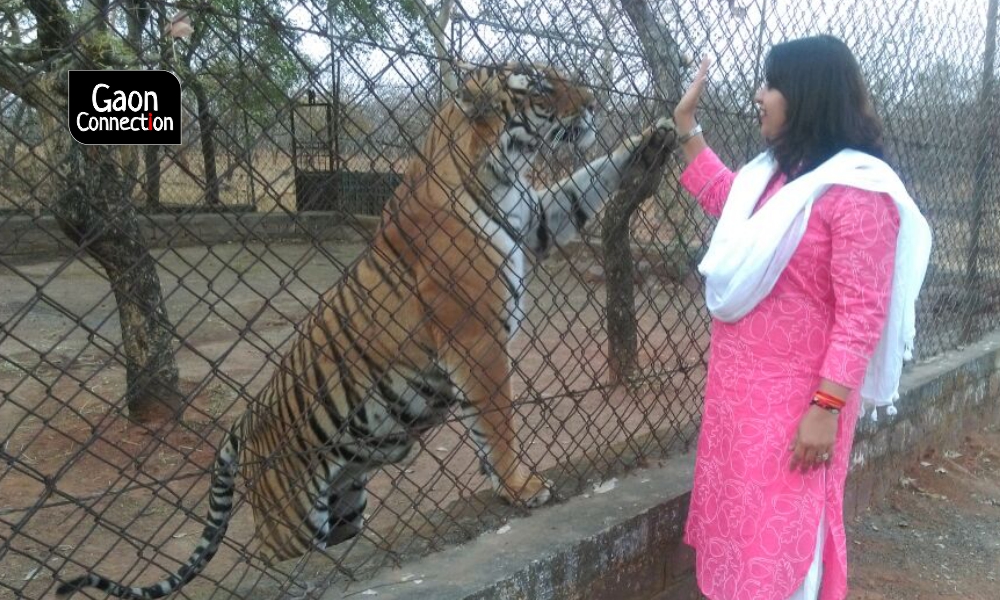In Van Vihar National Park, Bhopal, there’s a tigress Matakkali, who was involved in a human kill before being brought there. When Sameeta Rajora, an Indian Forest Service (IFS) officer, was director of the park between 2017 and 2019, and going on her rounds, Matakkali, by then less aggressive, would insist on putting on a full show for her within the enclosure — rolling around, jumping into the pond and giving a high five!
A lion at Van Vihar would not listen to the keeper and when it was time for his medicine, the keeper would request Rajora to come by and call him out. “The lion would listen to me,” recalled Rajora at an online talk ‘Challenges and opportunity for women officers in Zoo management’.
The event, organised by National Zoological Park, New Delhi, in collaboration with Indira Gandhi Zoological Park, Visakhapatnam, for Women’s Day on March 8, featured IFS officers Sameeta Rajora, Kamalika Mohanta, Kshitija, Yesoda Bai, Sudha Ramen, Nandani Salaria and Anamika Narwal, besides Ramesh Pandey, mentor to many and director of National Zoological Park, Delhi.
Pandey introduced the panel, spoke about the importance of zoos, the women who brought about innovative changes in operations, and more. “This discussion is to recognise lady officers presently heading zoos, and also call upon those who once headed them. They have valuable inputs to give, and out of sight should not be out of mind,” he said.
Recently, the Indian Forest Service Association (IFSA) has also partnered with Neelesh Misra’s Slow Content Pvt Ltd to share the untold stories of foresters through The Slow App. There will be a dedicated IFSA channel on The Slow App, which shall host storytelling by Misra and other artistes mentored by him, related to the bravery, sacrifices and triumph of IFS officials and field staff, as well as specially-created video and audio content ranging from long-form video films to podcasts.
Meanwhile, during yesterday’s two-hour-long conversation, peppered with anecdotes, policy talk and a lot of laughter, there was a lot of learning too. Edited excerpts:
Nandani Salaria
Empathy is the biggest thing a woman brings to the table, said Salaria, curator, Indira Gandhi Zoological Park, Visakhapatnam (Vizag). “Sometimes, the animals appear in our dreams. If they are unwell, you cannot sleep in the night. You feel an innate connection with the animals,” she added.
The Vizag zoo is about five decades old. Salaria joined the zoo in June last year, and in July, Salaria began the process of raising grass, fruit and vegetables in the fodder plot. “We are now able to produce food that is economical and hygienic. The staff ensured the idea worked,” said Salaria, who said it was also important to place staff welfare first. “Ask them how they are before you check on the animals. It makes a difference,” she said.
Salaria, a veterinarian, also put in place sanitary napkin vending machines and mirrors in the restroom. Plans are afoot to set up feeding rooms for nursing mothers too.
Also Read: Operation Durga Vahini to capture and move a tigress and her cub from Kerwa
Sudha Ramen
Ramen is a familiar name in Chennai for her work as deputy director, Arignar Anna Zoological Park in Vandalur, where she was posted from 2017-2020. When Ramen was posted there, the zoo was still in a bad shape after Cyclone Vardah, which wreaked havoc, bringing down trees and infrastructure.
“Our Google reviews were at 3.6. We worked hard to go through reviews and implement changes, and brought it up to 4.2. I learnt the importance of building a team that will work on the ground 24×7,” said Ramen, whose Madhubani artwork graces the cover of a book on women forest officers released by Union environment and forest minister Prakash Javadekar for Women’s Day.
So happy to see the launch of this book which talks about many lady IFS officers and their contributions. The additional happiness is about the COVER page of the book which is one of my paintings which captures the various roles of the Forest officers in the Madhubani style. https://t.co/0d23hbSNfv pic.twitter.com/2vIWUgJmnG
— Sudha Ramen 🇮🇳 (@SudhaRamenIFS) March 8, 2021
Among Ramen’s work at Vandalur was restoring a lake to ensure water supply for the animals and a successful rhino exchange programme. She said among women’s biggest attributes was the ability to listen. “Spend time with your staff, listen to them. That will solve seventy per cent of the issue,” said Ramen who conceded the zoo comes first, then family.
Also Read: Why T4 is considered the queen of Panna Tiger Reserve
Sameeta Rajora
The best part about working in a zoo is that you feel the animals’ pain and happiness and experience their affection, said Rajora, who is now additional principal chief conservator of forest (Vigilance/Grievances) in Bhopal. “Dealing with free-ranging herbivores and captive carnivores, which are rescued from the wild or circuses, and looking after their upkeep is a lot of work, but hugely satisfying,” she said.
Rajora spoke about racing against time when Kanha, a 14-year-old tiger, contracted canine distemper and seven other cats (panthers, tigers and lions) were infected. “We did not know how they got infected. We lost Kanha, but ensured the others recovered and there was not a trace of the virus during tests later,” she said.
Rajora counts among her successes the upgradation of the veterinary hospital in the zoo to national standards and creation of an indoor facility for carnivores and herbivores with CCTV facility. But most of all, “I think I helped convert a mindset — trainers started looking at the animals as their wards.”
Two years since she left Van Vihar, Rajora still goes back to see Sona, the sambar who has now delivered a “boy” and her other favourites. And, she fondly remembers Mona, the late female rhesus monkey that was a true-blue “complaint box”, speaking to her all the time.
Yesoda Bai
The district forest officer of West Godavari District, Eluru and former curator of Sri Venkateswara Zoological Park Tirupati and Indira Gandhi Zoological Park, Visakhapatnam, primarily spoke about learning on the job, especially when it came to animal exchanges and management within the zoo.
“Once we were putting transponders on young big cats between two and three years of age. The vet had just given a shot of tranquiliser medicine when a white tiger inside the cage jumped 10 feet high in the air. It took us all by surprise,” recalled Bai.
If the tiger had moved to the moat and the tranquiliser kicked in, they could have lost the cat. “But, the keepers were able to move in quickly and send the agitated animal back to the enclosure. Having practical experience in zoo management always comes in handy during delicate situations,” Bai added.
Bai spoke about how when working in a zoo, one is always emotionally connected to animals day in and out. She referred to an incident when this empathy for animals and working with those skilled animal keepers helped while shifting animals within the zoo, without having to tranquilise them.
Also Read: The unusual story of Tiger ‘P212’ who was tranquilised eight times to keep him safe
Kamalika Mohanta
Mohanta, now posted chief conservator of forests, Ujjain, Madhya Pradesh, began the Anubhuti programme in Van Vihar in December 2019. Anubhuti, sponsored by the eco development board of Madhya Pradesh, is primarily targeted at special children and children from SOS Children’s Villages. “So far, about 800 children have visited the zoo as part of Anubhuti and it is wonderful to see the joy and satisfaction on their faces,” she said.
As part of Anubhuti, during the COVID-19 lockdown, they tried a social interface to increase awareness and promote bird-watching with limited participants. Online events were held too.
Anamika Narwal
Speaking about handling questions about being posted in a zoo, the Union Territory cadre officer said this was an opportunity no one should pass up. She’s now joint director at National Zoological Park, New Delhi, and said she got to see the Caesarean of a tigress on her very second day.
“Every day is a new challenge. There are ten verticals, and it is like an industry. It’s a round-the-clock job for those interested.”
Narwal also spoke about the need to increase female animal handlers, because “it called for more mental strength than anything else”.
“This job is a privilege, for you get to work with animals who cannot speak for themselves,” she added.



















